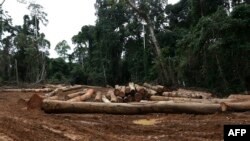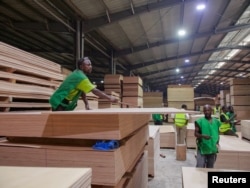Officials say most member states in the Central African Economic and Monetary Community, CEMAC, have failed to honor a ban on raw timber exports that was enacted last year to conserve forests and create jobs by locally processing wood.
The six member countries of the Central African bloc agreed to ban raw timber exports starting in January 2022. The ban is aimed partially at combating climate change by protecting forests from excessive logging.
However, an online meeting of CEMAC forestry and finance ministers Thursday found that only Gabon and the Republic of Congo have suspended the timber exports to China and other Asian countries. Cameroon, the Central African Republic, Chad and Equatorial Guinea have not.
Cameroon's finance minister, Luis Paul Motaze, said Cameroon needs the tax money from the exports, which earned the country $127 million last year.
He said a study conducted in 2022 by CEMAC shows if central African states stop raw timber exports, they will lose one percent of their gross domestic product. That is not healthy for a community that wants to develop, Motaze said, adding that local industries do not have the equipment for transforming timber into a variety of finished products.
The deadline for implementing the ban was initially pushed back to January 2023 to give the CEMAC countries more time to comply. Motaze suggested the bloc push back the deadline again to 2025 so countries have more time to invest in wood processing equipment and in training workers.
The Republic of Congo and Gabon have already made some investments toward that goal and say their timber exports are now restricted to only semi-finished or finished wood products.
Samuel Nguiffo, director of the Yaounde-based Center for Environment and Development, told Cameroon's state broadcaster that central African states should not fear lost revenues from banning logging exports.
He said banning raw timber exports will reduce deforestation, protect central Africa's declining forests, spur local wood processing, stimulate growth and create jobs. In the long run, he added, CEMAC member states will generate more revenue from local sales and exports of processed timber products.
Nguiffo said exporting raw timber means most of the profits go to processing industries in China and other Asian countries with high demand for raw materials.
A 2021 Central Africa Forest Observatory report says since 2011, most of Central Africa's 4.2 million tons of exported wood has gone to markets in Asia. During that time, the report says, annual timber exports to Europe dropped in value by more than half to $600 million.
The EU banned the sale of illegally harvested timber and timber products in 2012, and in 2021 restricted products suspected of contributing to deforestation.
The United Nations says climate change and overlogging are threats to Central Africa's forests, the second largest moist tropical forests in the world after South America's Amazon.





